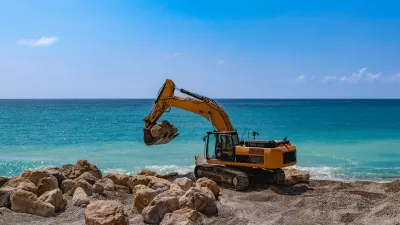A bill proposed in the U.S. Senate provides a model for how the federal government could support resilience planning in waterfront and coastal communities.
"At the beginning of August, Sen. Tammy Baldwin (D-Wisc.) introduced legislation to protect and enhance waterfront communities around the country by promoting economic investment, planning, and resilience," reports Kirsten Holland.
The Waterfront Community Revitalization and Resiliency Act (S. 1935) bill "directly supports local planning initiatives to revitalize and increase public access to waterfront areas and improve coastal resiliency."
If passed by Congress, the Resilient Waterfront Community program would designate communities as eligible for grants created by the legislation. According to Holland, "[t]he bill authorizes $50 million annually to provide individual grants ranging from $50,000-$1 million each. This grant funding would be awarded to local governments or tribes, which could then allocate the money accordingly for planning and implementing the community’s Resilient Waterfront Community plan."
Senator Baldwin put out a press release and a fact sheet [pdf] to provide more information to make the case for the legislation.
FULL STORY: New Legislation Directly Supports Waterfront Resilience Planning and Implementation Projects

Study: Maui’s Plan to Convert Vacation Rentals to Long-Term Housing Could Cause Nearly $1 Billion Economic Loss
The plan would reduce visitor accommodation by 25,% resulting in 1,900 jobs lost.

North Texas Transit Leaders Tout Benefits of TOD for Growing Region
At a summit focused on transit-oriented development, policymakers discussed how North Texas’ expanded light rail system can serve as a tool for economic growth.

Using Old Oil and Gas Wells for Green Energy Storage
Penn State researchers have found that repurposing abandoned oil and gas wells for geothermal-assisted compressed-air energy storage can boost efficiency, reduce environmental risks, and support clean energy and job transitions.

Private Donations Propel Early Restoration of Palisades Playground
Los Angeles has secured over $1.3 million in private funding to restore the Pacific Palisades playground months ahead of schedule, creating a modern, accessible space that supports community healing after recent wildfires.

From Blight to Benefit: Early Results From California’s Equitable Cleanup Program
The Equitable Community Revitalization Grant (ECRG) program is reshaping brownfield redevelopment by prioritizing projects in low-income and environmental justice communities, emphasizing equity, transparency, and community benefits.

Planting Relief: Tackling Las Vegas Heat One Tree at a Time
Nevada Plants, a Las Vegas-based nonprofit, is combating the city’s extreme urban heat by giving away trees to residents in underserved neighborhoods, promoting shade, sustainability, and community health.
Urban Design for Planners 1: Software Tools
This six-course series explores essential urban design concepts using open source software and equips planners with the tools they need to participate fully in the urban design process.
Planning for Universal Design
Learn the tools for implementing Universal Design in planning regulations.
Ascent Environmental
Borough of Carlisle
Institute for Housing and Urban Development Studies (IHS)
City of Grandview
Harvard GSD Executive Education
Toledo-Lucas County Plan Commissions
Salt Lake City
NYU Wagner Graduate School of Public Service




























